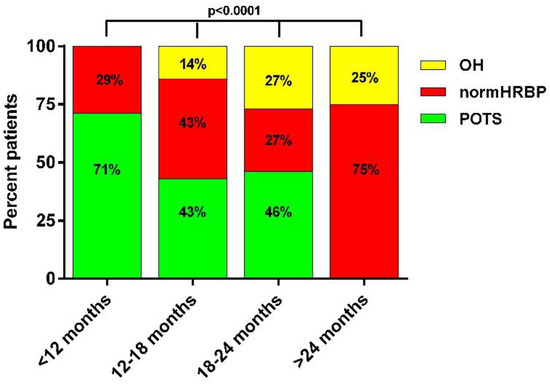Sly Saint
Senior Member (Voting Rights)
authors van Campen, Frank Visser
Abstract
Background:
Postural orthostatic tachycardia syndrome (POTS) has been described early after the onset of the COVID-19 infection, but also orthostatic hypotension (OH). In the present study, we hypothesized that orthostatic intolerance decreases over time.
Methods:
In 29 long-haul COVID-19 (LHC) patients, a tilt test was performed, including measurements of cerebral blood flow (CBF) by extracranial Doppler. The time interval between the onset of infection and the tilt test varied between 3 and 28 months.
Results:
In the first 12 months after the infection, 71% of the LHC patients showed POTS and after 24 months none of them. In the first 12 months, 29% of patients had a normal heart rate and blood pressure response (normHRBP) and after 24 months 75% (distribution of POTS, OH, and a normHRBP over time: p < 0.0001). Linear regression showed that, over time, there was a decrease in the abnormal CBF during the tilt (p = 0.024) but remained abnormal.
Conclusion:
In LHC patients, hemodynamic abnormalities of a tilt test change over time. Patients studied early after the onset of the disease mainly exhibit POTS, but patients studied later in the time course mainly show a normHRBP or OH. In addition, the abnormal CBF reduction improves over time, but CBF remains abnormal.
https://www.mdpi.com/2227-9032/10/10/2105
Abstract
Background:
Postural orthostatic tachycardia syndrome (POTS) has been described early after the onset of the COVID-19 infection, but also orthostatic hypotension (OH). In the present study, we hypothesized that orthostatic intolerance decreases over time.
Methods:
In 29 long-haul COVID-19 (LHC) patients, a tilt test was performed, including measurements of cerebral blood flow (CBF) by extracranial Doppler. The time interval between the onset of infection and the tilt test varied between 3 and 28 months.
Results:
In the first 12 months after the infection, 71% of the LHC patients showed POTS and after 24 months none of them. In the first 12 months, 29% of patients had a normal heart rate and blood pressure response (normHRBP) and after 24 months 75% (distribution of POTS, OH, and a normHRBP over time: p < 0.0001). Linear regression showed that, over time, there was a decrease in the abnormal CBF during the tilt (p = 0.024) but remained abnormal.
Conclusion:
In LHC patients, hemodynamic abnormalities of a tilt test change over time. Patients studied early after the onset of the disease mainly exhibit POTS, but patients studied later in the time course mainly show a normHRBP or OH. In addition, the abnormal CBF reduction improves over time, but CBF remains abnormal.
https://www.mdpi.com/2227-9032/10/10/2105

